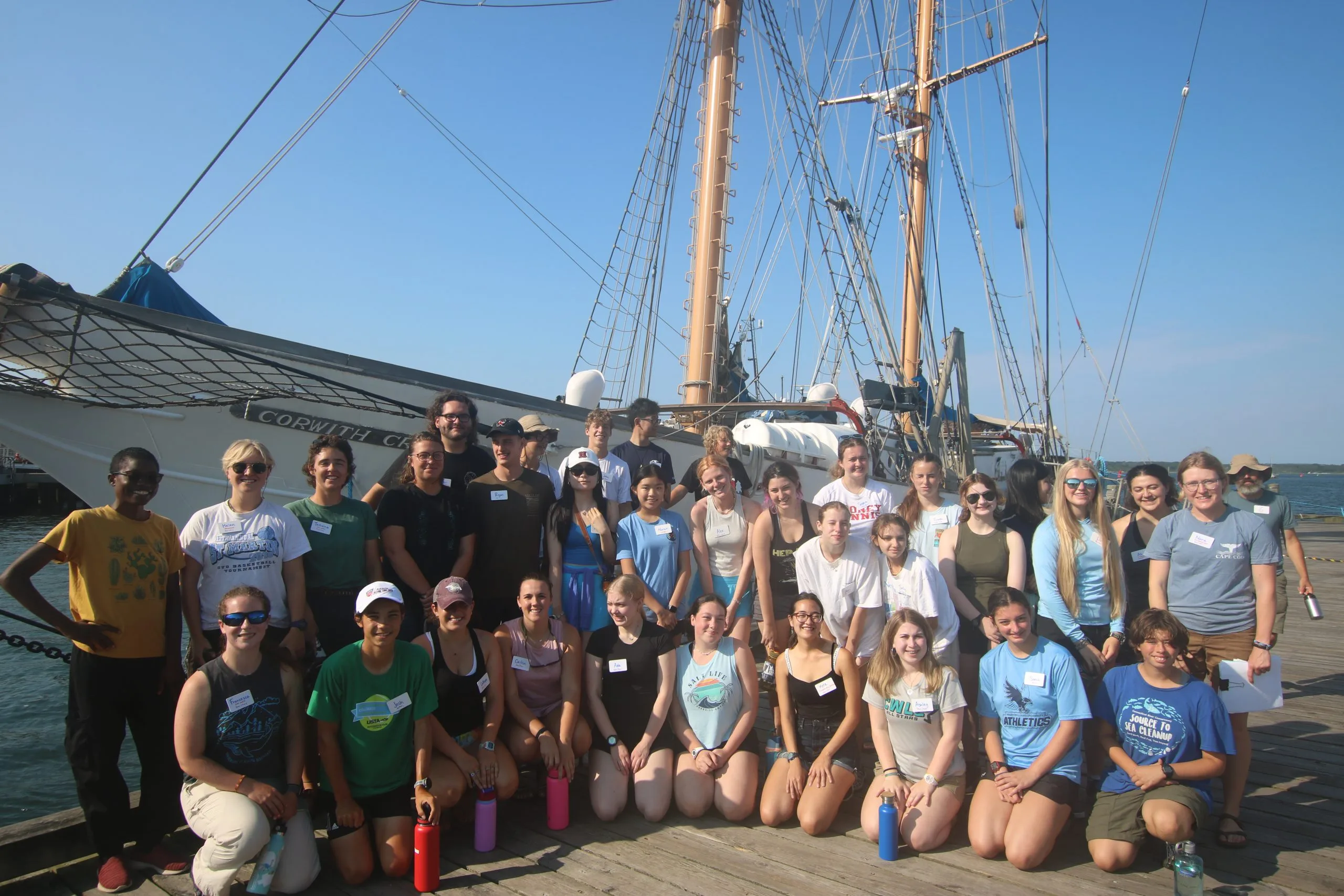Programs Blog
Welcome Aboard SEA Ex Session 2!

Author: Jeff Schell, Chief Scientist
Ship’s Log
Sunday-Monday, July 14-15th, 2024
Position (Lat and Long): 41° 31.4’N x 070° 40.2’W
Log (nm): 0.0 nm. We are still alongside the dock.
Weather / Wind and Sail Plan: Steady breeze from the southwest, mostly sunny.
Description of where we are sailing: No sails yet, we are still alongside Dyers Dock in Woods Hole, MA.
Welcome aboard! So excited to welcome our new shipmates aboard the SSV Corwith Cramer. We now have 38 crew onboard: 15 professional crew from SEA and 23 newly arrived student crew. Before we can set sail we have to prepare our new shipmates for their responsibilities as members of the crew. There is so much to learn. Once they stepped aboard it is like crossing the border into a new country, with a new ‘language’ and customs. They must learn the ways of the ship before we can leave the dock.
There was a thorough safety training, in the galley, the engine room and in the lab. The students all met with our Chief Mate Spatch and learned about standing a Watch (the six-hour period when one group of students is responsible for the sailing, the science, and the safety of the ship!).
Don’t worry, there was also plenty of time for the students to simply hangout and get to know each other. Since we are each, individually responsible for the ship and our shipmates, it helps if you know who is taking care of the ship when you are down in your bunk sleeping.
As far as I can tell, I am going to sleep well tonight! We have a great crew, and I am looking forward to the rest of our adventure together.
The following day was busy both on and off the ship. We start the day early onboard the Corwith Cramer – 0630 wakes for an 0700 breakfast. After morning chores (cleaning up galley dishes, sweeping the soles, wiping down the tables and bathroom areas) we all headed to SEA’s main campus to meet with Loraine Snead who provided a thought-provoking workshop on community forming and belonging. There were fun and challenging games that helped us all form connections and bonds with our fellow shipmates.
Then it was back to the ship for hands-on training on how to safely handle all the lines that allow us to set and strike sail, how to operate the scientific hydrowinch and hydraulic J-Frame used to deploy oceanographic equipment, and finally, training on the infamous Boat Check. The hourly walk through of all ship spaces to check for anything that may be amiss. The Boat Check is our preventative measure to keep the ship safe from fire, flooding, and other emergencies. Catch any potential problem before it starts!
After a long day of training the new crew had earned a bit of time for rest and relaxation. A short walk through town leads to Stony Beach (a misnomer used by locals to keep the tourists away!) where the students and crew enjoyed a lovely swim call before dinner.
To end the evening, I provided a short description of the oceanographic conditions we might encounter during our voyage around Cape Cod and the Islands (Martha’s Vineyard and Nantucket). It was a lively discussion of seafloor geology, ocean currents, and marine food webs.
Jeff Schell, Chief Scientist
Recent Posts from the Ships
- Ocean Classroom 2024-A collaborative high school program with Proctor Academy
- Collaborations and Long-term Commitments: SEA’s Caribbean Reef Program Sets a Course for Coastal Programs that Compliment Shipboard Experiences.
- Sea Education Association students prepare for life underway using state of the art nautical simulation from Wartsila Corporation.
- SEA Writer 2022, Magazines From the Summer SEA Quest Students
- Technology@SEA: Upgrades Allow Insight into Ocean Depths
Programs
- Gap Year
- Ocean Exploration
- High School
- Science at SEA
- SEA Expedition
- SEAScape
- Pre-College
- Proctor Ocean Classroom
- Protecting the Phoenix Islands
- SPICE
- Stanford@SEA
- Undergraduate
- Climate and Society
- Climate Change and Coastal Resilience
- Coral Reef Conservation
- Marine Biodiversity and Conservation
- MBL
- Ocean Exploration: Plastics
- Ocean Policy: Marine Protected Areas
- Oceans and Climate
- Pacific Reef Expedition
- The Global Ocean: Hawai'i
- The Global Ocean: New Zealand